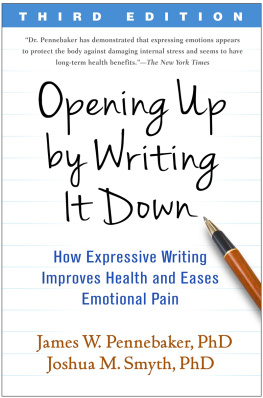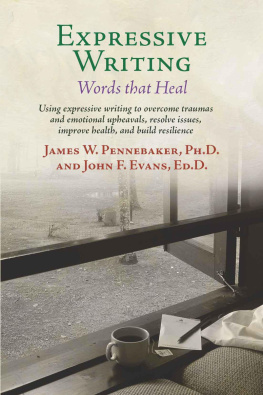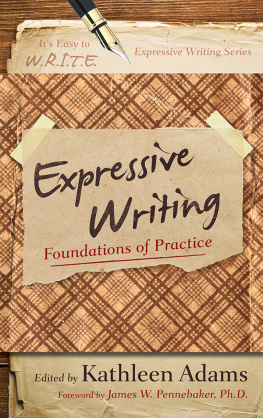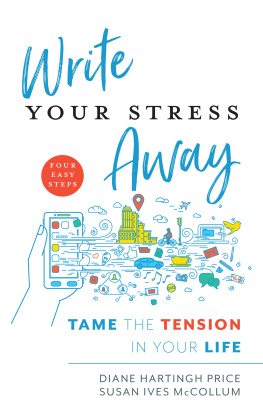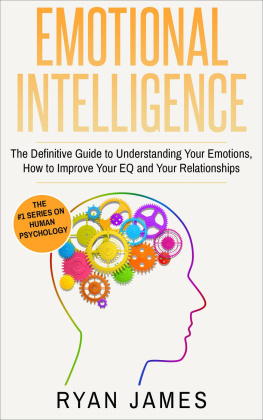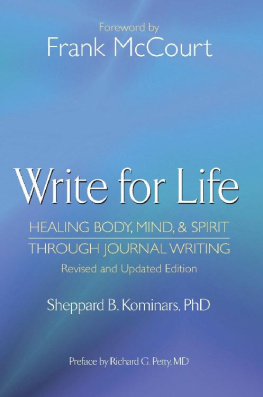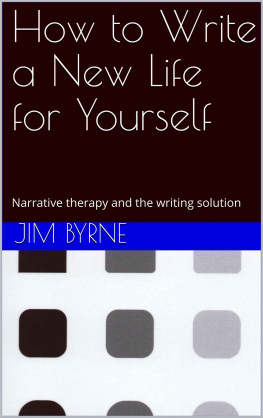The power of expressing emotions is one of the most important discoveries psychologists have ever made. The authors blend scientific rigor with practical wisdom, in an accessible book chock-full of insights. Write it down!
Shelley E. Taylor, PhD, Distinguished Professor,
Department of Psychology, University of California, Los Angeles
An absorbing account of expressive writing and how it works. This book is full of ideas and techniques that will benefit anyone who reads it.
Timothy D. Wilson, PhD, author of Redirect: Changing the Stories We Live By
Fascinating. We learn that writing positively affects the immune system and can be a powerful tool in the treatment of trauma, psychological problems, and chronic disease. If you want to jump-start your brain, cleanse the mind, or resolve troublesome experiences, check out this classic book.
Susan M. Pollak, MTS, EdD, psychologist, Cambridge, Massachusetts
Opening Up by Writing It Down, Third Edition, is a wonderfully crafted blend of engaging examples and current scientific knowledge. The authors make a compelling case that people can improve their overall health and well-being by writing about troubling feelings and experiences. The book is fun and motivating, and it includes helpful exercises and suggestions to get you started on this path to wellness.
Dena Rosenbloom, PhD, author of Life After Trauma
Opening Up
by Writing
It Down
THIRD EDITION
How Expressive Writing Improves Health and Eases Emotional Pain
JAMES W. PENNEBAKER, P H D
JOSHUA M. SMYTH, P H D

The Guilford Press
New York London
Epub Edition ISBN: 9781462526635; Kindle Edition ISBN: 9781462526642
Copyright 2016 The Guilford Press
A Division of Guilford Publications, Inc.
370 Seventh Avenue, Suite 1200, New York, NY 10001
www.guilford.com
All rights reserved
The information in this volume is not intended as a substitute for consultation with healthcare professionals. Each individuals health concerns should be evaluated by a qualified professional.
No part of this book may be reproduced, translated, stored in a retrieval system, or transmitted, in any form or by any means, electronic, mechanical, photocopying, microfilming, recording, or otherwise, without written permission from the publisher.
Last digit is print number: 9 8 7 6 5 4 3 2
Library of Congress Cataloging-in-Publication Data
Names: Pennebaker, James W., author. | Smyth, Joshua M., author.
Title: Opening up by writing it down : how expressive writing improves health and eases emotional pain / James W. Pennebaker and Joshua M. Smyth.
Other titles: Opening up
Description: Third edition. | New York, NY : The Guilford Press, [2016] | Revision of: Opening up / James W. Pennebaker. 1997. | Includes bibliographical references and index.
Identifiers: LCCN 2016006014 | ISBN 9781462524921 (paperback : acid-free paper)
Subjects: LCSH: Self-disclosureHealth aspects. | Written communicationTherapeutic use. | Stress (Psychology)Prevention. | Mind and body. | BISAC: PSYCHOLOGY / Mental Health. | MEDICAL / Mental Health. | RELIGION / Counseling. | SOCIAL SCIENCE / Social Work.
Classification: LCC RC455.4.I54 P46 2016 | DDC 616.89/165dc23
LC record available at http://lccn.loc.gov/2016006014
Contents
T hroughout this book, we refer to individuals we have studied or interviewed. In all cases, we have changed the names and other identifying information about the people involved to protect their anonymity. In addition, we have reconstructed some of the direct spoken quotations from memory or notes of conversations. The gist of each of the stories, however, is true and based on real people.
E xpressive writing is a technique where people typically write about an upsetting experience for 15 to 20 minutes a day for three or four days. This very simple exercise has been found to improve peoples physical and mental health for weeks, months, and even years when compared to individuals who write about emotionally neutral topics (or other comparison groups). The method was first described in a scientific paper in 1986, and since then several hundred expressive writing experiments have been conducted.
Expressive writing is not simply a form of journaling or diary writing. Its not a practice that will help you become a novelist or screenwriter. Rather, it is a brief writing technique that helps people understand and deal with emotional upheavals in their lives. It is a little like a self-help therapy without outlandish claims. Its greatest appeal is that it is a method with strong scientific evidence behind it.
This book was written with two audiences in mind. The first includes people who may be dealing with a difficult personal situation who want to know more about ways to get through a tough time. The second group of readers includes those who are simply curious about expressive writing and how it works. We hope that we motivate current or prospective students, colleagues, and laypeople to think more about the fascinating topics surrounding expressive writing.
The original editions of the book were published in 1990 and 1997. So much has happened since the earlier editions. A more complete story was needed for a broader audience. Expressive writing has been used to treat a variety of physical health problems as well as mental health issues such as anxiety, depression, and posttraumatic stress disorder (or PTSD). Weve learned that expressive writing improves college adjustment and results in better grades. It even helps peoples relationships and love lives.
But, as you will see, writing doesnt work with everyone. The effects are typically modest but usually beneficial, helping people across cultures and circumstances. In this edition, we offer opportunities to try it yourself in different ways. We still dont have a solid explanation of why it does and doesnt workalthough we are getting some better ideas. The writing research community is made up of clinical, social, health, and cognitive psychologists; social workers; physicians; and even the occasional person in business and education.
The expressive writing world is far more complex and dynamic today than it was 30 years ago when Jamie Pennebaker first described the early findings. The current book has a far greater reach because of the collaboration with Joshua Smyth. Whereas Jamie was the inventor of the method, Josh advanced the field through his hard-nosed experiments and concise scientific mind. The two of us have worked closely together to bring a much more modern and, we hope, balanced view to the expressive writing literature.
We similarly hope you find this book both honest and helpful. Although we are convinced that expressive writing can be a valuable tool, we are not true believers. There isnt any one way to write. What works for some people may not work for you. By seeing the different ways that writing has worked in research studies, we hope you might be encouraged to try writing on your own.
Above all, we encourage you to become your own scientist. If you, a friend, or a client is plagued with unwanted thoughts, memories, or worries, expressive writing may be helpful. If it isnt helpful, try writing in some different ways. If it still doesnt help you, try other avenuestherapy, exercise, meditation, or something else. Experiment, experiment, experiment.
A book such as this is ultimately a joint work of hundreds of people. We are humbled by the colleagues, editors, therapists, students, and practitioners who have influenced our thinking and, more generally, the direction our research has taken us. More immediately, the research on which this book is based was conducted with the help of thousands of participantssome healthy college students and others suffering from disease or other painful life circumstances. To conduct these studies, we have often relied on the help and collaboration of an amazing group of graduate and undergraduate students over the last three decades. Finally, we thank our family and friends for sharing their lives with us while we lost ourselves in our labs. We are deeply grateful and indebted to all of you.
Next page
